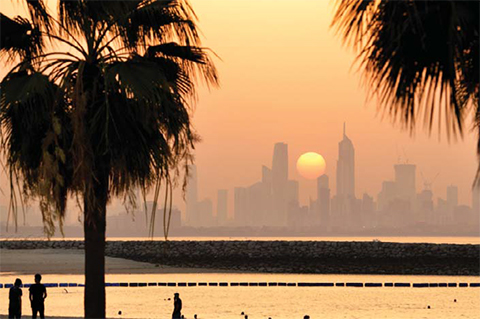State sinks 20 spots in global corruption index
KUWAIT: Kuwait dropped 20 spots in the latest Corruption Perception Index released by Transparency International yesterday, which also saw regression across the board among Arab countries.
The Corruption Perception Index 2016 ranks Kuwait 75th out of 176 countries worldwide, with a score of 41 points out of a possible 100. Kuwait had ranked 55th out of 168 countries in the 2015 index with 49 points.
Kuwait was tied in the 75th place with Tunisia, Bulgaria, and Turkey. Furthermore, Kuwait tied with Tunisia for seventh among Arab countries, falling behind the United Arab Emirates (24th worldwide), Qatar (31), Jordan (57), Saudi Arabia (62) Oman (64) and Bahrain (70).
Transparency International had suspended the membership of the Kuwait Transparency Society (KTS) on June 5, 2015 after the government dissolved its elected board and replaced it with government appointees. “In order to protect the staff and membership of KTS, a fully accredited chapter of Transparency International, Transparency International’s board has passed a resolution suspending the organization from the Transparency International movement until further notice,” the Berlin-based organization said in a press statement released on June 11, 2015.
Notably, the UAE dropped four points in 2016’s index compared to 2015, while Qatar dropped 10 points. Globally, New Zealand moved into a tie with Denmark for the number one spot, after each finished with 90 points. Meanwhile, Finland and Sweden retained their third and fourth ranks respectively, while Switzerland rounded up the top five. On the other hand, the United States dropped two spots and ranked 18th with 74 points.
The bottom five include Yemen, Syria, North Korea, South Sudan and Somalia as the country with the worst score (10 points). More countries declined than improved in the 2016 index compared to a year before.
This year’s results highlight the connection between corruption and inequality, which feed off each other to create a vicious circle between corruption, unequal distribution of power in society, and unequal distribution of wealth, Transparency International said in a statement yesterday. “In too many countries, people are deprived of their most basic needs and go to bed hungry every night because of corruption, while the powerful and corrupt enjoy lavish lifestyles with impunity,” said Jose Ugaz, Chair of Transparency International.
According to the organization, lower-ranked countries are plagued by untrustworthy and badly functioning public institutions like the police and judiciary. “Even where anti-corruption laws are on the books, in practice they are often skirted or ignored. People frequently face situations of bribery and extortion, rely on basic services that have been undermined by the misappropriation of funds, and confront official indifference when seeking redress from authorities that are on the take,” the report reads.
On the other hand, it says that higher-ranked countries tend to have higher degrees of press freedom, access to information about public expenditure, stronger standards of integrity for public officials, and independent judicial systems. “But high-scoring countries can’t afford to be complacent, either,” it noted. “While the most obvious forms of corruption may not scar citizens’ daily lives in all these places, the higher-ranked countries are not immune to closed-door deals, conflicts of interest, illicit finance, and patchy law enforcement that can distort public policy and exacerbate corruption at home and abroad.”
By A Saleh











